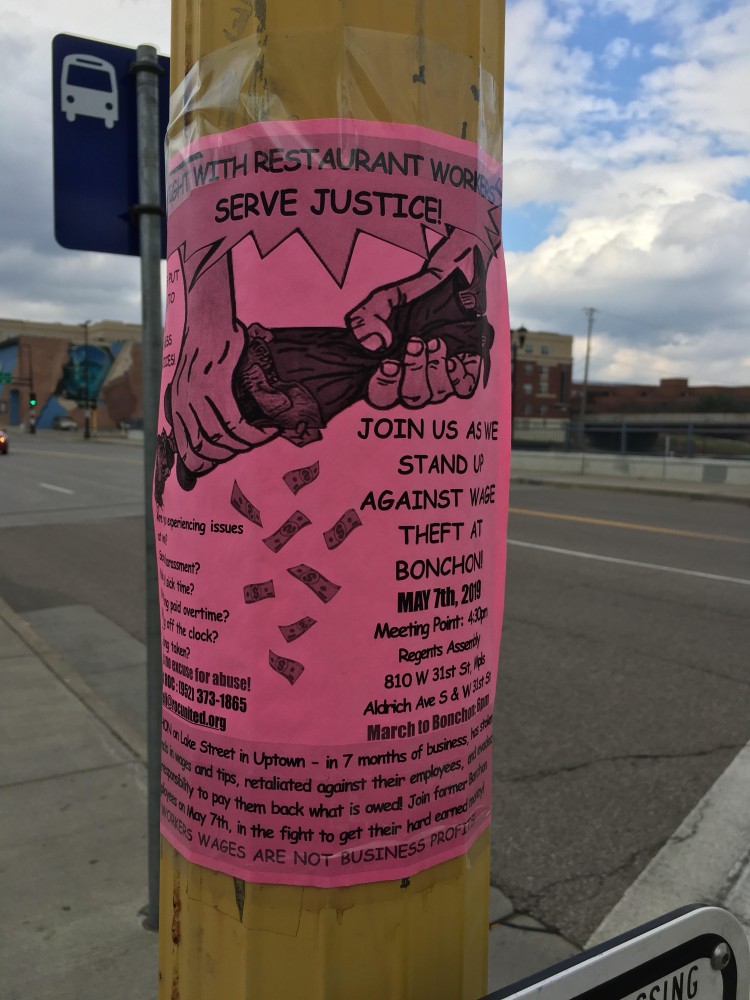As a new state law tackling wage theft goes into effect, local employees and officials are speaking out about the issue.
The law, effective July 1, requires employers to keep and provide more records documenting a person’s employment. By Aug. 1, wage theft, including minimum wage violations, unpaid work and withheld tips, will be a felony. A University of Minnesota-area city council member recently introduced a similar ordinance that would go into effect in January.
The new policies come as Dinkytown expects a new restaurant franchise that has seen past accusations of wage theft.
Ward 3 City Council member Steve Fletcher, a co-author of the ordinance, said his ward is home to workers like freelancers, service workers and students who are more likely to see wage theft.
“My hope is that this provides some protection to seasonal workers, like students, who often don’t have the same kind of stable jobs that other people have, and are probably more vulnerable to wage theft as a result,” Fletcher said.
Passing the ordinance makes it easier for city staff and the Minneapolis Department of Civil Rights to take over in potential cases of wage theft, rather than requiring employees to go to state departments, Fletcher said.
The new state law requires employers to provide written notice that lays out terms of employment and payroll timeline to new hires. Employers are also encouraged to provide the notice to current employees.
The provisions can be a platform for workers to protect themselves from wage theft and employer retaliation, said Restaurant Opportunities Centers of Minnesota member and Minneapolis restaurant worker John Sandahl. Wage theft happens “all the time,” but can be subtle, Sandahl said.
“It’s a huge, massive problem that affects mostly lower-paid workers, and people of color too in the restaurant industry. And I think that for a long time, it’s kind of been accepted as the norm,” Sandahl said.
Former workers at Bonchon’s Uptown location came forward with allegations of wage theft in December. Former Bonchon server Mya Bradford said during her time at the restaurant, employees were paid below minimum wage, among what she alleges are other pay violations.
“And it caused a lot of hardships on people, too,” Bradford said. “When I was working there, I was homeless trying to get an apartment, trying really, really hard. And I would be working a lot, and I was always just a little bit short.”
But Bonchon has reached an agreement with the city, said Bonchon Uptown owner Sam Zheng’s attorney Henry Pfutzenreuter. Pfutzenreuter said Bonchon’s failure to pay employees minimum wage stemmed from a misinterpretation of the city’s two minimum wages.
Zheng, who will also own the Dinkytown location, had assumed he needed to pay employees the city’s minimum wage requirement for a small business because he himself oversaw fewer than 100 employees, Pfutzenreuter said. In reality, because Bonchon is a franchise, he was actually required to pay the minimum wage required for a large business.
“One of the challenges of starting a business in Minneapolis is learning all of its ordinances that govern employment within the City, in addition to the many complex regulations that exist at the state and federal level as well,” Pfutzenreuter wrote in an email statement to the Minnesota Daily.
Pfutzenreuter said the wage issue has been corrected and employees will receive everything they are entitled to.
“A lot of time business owners look at workers as profits and we are not profits. We’re human beings and there is no way that we will let you take the money that you promised us,” Sandahl said.








